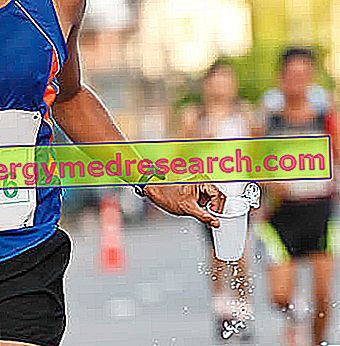Introduction
The body of an adult human is composed of 50-60% of water.
The functions of the body water are different:
- Temperature regulation.
- Digestion.
- Transport (circulatory and lymphatic stream) etc.

Running activity produces heat and muscles tend to accumulate it. The body cannot work at excessive temperatures and cools down with sweating. When the expulsion of water and salts from the skin through sweat is excessive or is not compensated, the mind loses its lucidity and its metabolic efficiency is compromised.
Hydration in the Race
Sweating is an extremely subjective process.
Some people sweat a little even when they run during the hottest hours of summer; others complain of a constant and significant loss of fluids even when stopped in winter.
To prevent dehydration it is first of all necessary to know how to listen and to treasure one's own experiences.
However, drinking during sports is not always easy and running is one of the most complicated activities.
Let us analyze the difficulties that can be encountered and their solution one by one.
Prevention
If it is true that dehydration is a bitter enemy of the runner, it is equally true that one can try to prevent it. Let's see how:
- Choosing a technical clothing: this is an aspect that does not concern this article but it is still very important.
- Training in the cooler hours: the temperature difference between morning and afternoon can be as high as 10 ° C.
- Drinking a lot: most athletes fight dehydration by drinking a lot of water only when they feel thirsty. On the other hand, sometimes it's not enough. In fact, thirst arises only after having lost a lot of fluids, while the goal of prevention is to NOT accumulate a significant water deficit. It is advisable to anticipate thirst by drinking even before the activity.
Unfortunately, running is a sport characterized by continuous rebounds. The stomach full of liquids rumbles and causes the so-called "botticle effect".
This disadvantage discourages many runners and causes them not to drink before or during training. Nothing could be more wrong.
Generally, this drawback can be reduced by carefully choosing the type of drink and consuming it in the most appropriate dosages and methods.
Absorption Capacity: Not Only Water
Contrary to what many people think, water is not the most absorbable beverage.
In fact, the mucous membranes of the stomach and of the intestine pick up more isotonic or mildly hypotonic liquids.
| Type of drink | Content | Indications |
| hypotonic | Fluids, electrolytes and a low carbohydrate content | Rapid rehydration, but little energy |
| Isotonic | Fluids, electrolytes and a 6 - 8% carbohydrate | Rapid rehydration and energy |
| hypertonic | High carbohydrate content | Poor and slow rehydration, but high energy |
To achieve an osmotic concentration similar to that of blood, water must be added with mineral salts and carbohydrates.
The best solution is certainly the use of a supplement based on minerals, maltodextrins and vitamins.
In this regard, it is important to keep in mind that an athlete has much higher water-saline needs than an ordinary person, which is why the choice of an integrator is anything but out of place.
Following a proper diet (food and drink) is certainly the most important aspect of sports nutrition; the power supply cannot be replaced by over-the-counter products. On the other hand, to increase the intake of certain nutrients there is the risk of introducing superfluous or excess elements.
For example, to increase potassium and magnesium it is necessary to increase the portions of fruit, vegetables, whole grains and legumes; however, this would increase the amount of fiber and anti-nutritional elements such as tannins, phytic acid and oxalic acid.
Temperature also plays a very important role. The absorption of liquids seems optimal at rather low temperatures but it is advisable to gradually try the best solution; the risk - by drinking too much water or spilling it with supplements - is to suffer side effects such as cramps, vomiting, diarrhea, etc.
Ready-to-wear
The second impediment that demotivates the runners in hydrating themselves is the difficulty of transport.
Some riders perform up to and over 5-6 hours of weekly training and the idea of holding a bottle for an hour and a half each time is unmotivating.
On the other hand, extremely useful and practical solutions have recently been invented. These are the bottle cage with a pouch or shoulder strap.
Obviously, it is not possible to carry exorbitant amounts of liquid. However, by drinking at least one liter of water in the two hours preceding the training and just as soon after, it is possible to achieve an excellent result.
Post Workout
The hydration of a runner is not guaranteed by a simple drink after training.
In addition to respecting what has been said so far, it is essential to carefully treat even the so-called post-workout.
In fact, after-run feeding is the most important aspect of recovery (super-training compensation). Eating well and "on time" guarantees a very fast recovery of the reserves and of the hydro-saline balance.
So far we have talked about absorption capacity, but not water and nutrient distribution. In fact, while the water quickly reaches all the districts, the mineral salts and certain molecules need a minimum time to cross the tissues and membranes.
All this makes us understand that the choice of a good supplement to alternate with water (before, during and after training) represents a strategic move to amplify the speed of recovery between running sessions.
How much do you drink?
The amount of liquids to be taken depends mainly on the sweating of the person running.
It is not possible to give a specific recommendation and any advice represents the fruit of a simple statistical analysis.
Generally about one and a half liters of liquid is lost every hour of running but certain predispositions and extreme conditions easily lead to sweat up to 4-5 liters.
With the loss of 2-3% of body weight in sweat we can already see a decrease in athletic performance.
The estimate of water losses can be carried out with double weighing, one before and one after the run; based on that value it will be possible to understand how much to drink the next time.
To be sure of guaranteeing hydration in an average person, it is advisable to drink at least 2-2.5 liters of water and supplement distributed before, during and after training.



